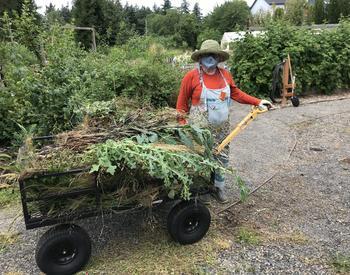I am beyond proud to share with you the 2020 Impact Report of the OSU Extension Master Gardener Program. Working on the report, and reading about the real difference that Master Gardeners made in their communities during a difficult year made my heart swell with hope and happiness. I hope that you will feel a measure of pride, reading about the great work of your Master Gardener colleagues across the state.

Perhaps more than any other year in recent history, gardens provided food, solace, and hope. Even more than that, gardens truly became tools of economic security and resilience, and it will be our challenge in 2021 and beyond to ensure that ALL gardeners and potential gardeners have access to the gifts of gardening.
To put things in a broader perspective, in 2020, the COVID-19 pandemic and summer wildfires exerted stress on multiple pressure points related to the economic and food security of U.S. households: more people reported being in need of food aid and more people (including, but beyond those in need of food aid) reported being concerned about food access. In April of 2020, the unemployment rate jumped 10.3 percentage points to 14.7%, in what represented the single largest monthly increase since the employment statistics have been tracked (US Bureau of Labor Statistics 2020). Local and national news media reported surges in demand for food aid from food banks and food pantries across the United States. In addition, reports of disruptions to global food production and distribution chains, compelled the FDA (2020) and the USDA (Johansson 2020) to respond to public concern and fear related to food shortages.
The United States has a long history of turning to gardening in times of national emergency, starting with the Victory Garden movements of WW I (Hayden-Smith 2014) and WWI II (Lawson 2014). ‘Recession gardens’ followed the great recession of 2008, with more than 43 million households reporting an intention to grow their own food in 2009, which was a 19% increase from the previous year (NGA 2009). In response to the COVID-19 pandemic, University Extension Services across the nation saw large increases in the number of people who are seeking information on growing their own food.
This is exactly what OSU Extension saw in 2020. We saw a 67% increase in the number of people submitting questions on OSU’s Ask an Expert Service. We saw a 125% increase in the number of people who ‘liked’ us on Facebook. We saw a 2,806% increase in the number of people signing up for online gardening courses!
In 2020, Master Gardener volunteers were needed more than ever ~ and you rose to the challenge in many different innovative and profoundly moving ways. Thank you.
Special thanks to everyone who contributed photos, stories, and statistics for the impact report, and extra special thanks to LeAnn Locher for helping the stories come to life with such a beautiful design.
- Hayden-Smith, R. 2014. Sowing the Seeds of Victory: American gardening programs of World War I. 264 pp. McFarland
- Johansson, R. 2020. Will COVID-19 threaten availability and affordability of our food? USDA Blog April 16, 2020. https://www.usda.gov/media/blog/2020/04/16/will-covid-19-threaten-availability-and-affordability-our-food
- Lawson L.J. (2014) Garden for Victory! The American Victory Garden Campaign of World War II. In: Tidball K., Krasny M. (eds) Greening in the Red Zone. Springer, Dordrecht.
- US Bureau of Labor Statistics. 2020. Employment situation summary, April 2020. Economic News Release USDL-20-0815, May 8, 2020. https://www.bls.gov/news.release/empsit.nr0.htm




